AI for Sales Prospecting: Complete Guide for 2025
Casey O'Connor
Artificial intelligence (AI) is perhaps the fastest-growing trend in sales—and chances are high that it’s well on its way from “trend” to “permanent disruption in the field.”
Recent reports show that 40% of sales and marketing teams are already using AI in their processes, and an additional 44% are planning to implement it and evaluating their options.
That being said, AI is not a catch-all. It shouldn’t be responsible for all of your sales processes, and it won’t solve all of your pipeline problems if you don’t put in the work. The sales teams that use AI most effectively know how and when to leverage its capabilities at the most strategic times.
One area that has been somewhat overlooked in this market is AI for sales prospecting.
While many sales teams rely on the benefits of AI for things like inputting data and building buyer profiles, its use cases in prospecting are vast and powerful.
In this article, we’ll go over everything you need to know about how to use artificial intelligence to your advantage when prospecting, including specific types of tools to consider adding to your tech stack, practical tips for implementing AI, and some common challenges you may encounter.
Here’s what we’ll cover:
- The Basics of AI in Sales Prospecting
- How AI Can Enhance Sales Prospecting Strategies
- AI Tools and Technologies for Sales Teams
- AI-Powered Sales Prospecting Tools
- Practical Tips for Implementing AI in Your Sales Processes
- Challenges and Considerations
The Basics of AI in Sales Prospecting
The term “AI” is actually an umbrella term and encompasses several different types of technology that can be used throughout the sales process.

Sales AI may include things like machine learning, natural language processing, deep learning, and more.
AI for sales prospecting helps sales reps complete various parts of the prospecting process more efficiently. These tools help teams:
- Communicate more effectively with prospects and with one another
- Be more productive with their time
- Close more deals
Sales reps can use AI for virtually any part of the sales prospecting process, from locating promising leads based on sophisticated criteria to maintaining proper data hygiene to scoring leads.
And, of course, AI software is more than capable of automating routine tasks like cold calling and booking meetings.
The list of capabilities of AI for sales prospecting is impressive and growing every day.
How AI Can Enhance Sales Prospecting Strategies
Let’s take a closer look at some of the specific ways AI can take your sales prospecting techniques to the next level.
Powered-up Productivity
Prospecting can be a very tedious and slow-going part of the sales process. There are tons of manual tasks that need to be completed accurately for the process to run smoothly.
That’s where AI comes in.
AI for sales prospecting is built to do the heavy lifting of the mundane, manual, and meticulous parts of this important stage in the sales funnel.
In fact, these tools remove a significant, tangible amount of work from sales reps’ plates early on in the sales process, with Hubspot’s State of AI reporting that AI sales prospecting software saves reps an average of two hours and fifteen minutes a day by completing automated tasks.
And, the less time they’re forced to spend on tasks like accurate data entry, scoring leads, and segmenting prospect lists, the more productive they can be regarding sales activities that actually move the needle with buyers.
Powered-up Data
Another tremendous benefit of using AI for sales prospecting is the way it easily locates, organizes, and draws insights from a staggering amount of data—far more than any human-powered sales team could ever achieve on their own.
When it comes to sales data, sales AI can help sales teams:
- Improve the quality of their data
- Perform routine data enrichment
- Manage data hygiene best practices
- Organize and segment data for strategic prospecting
It’s hard to overstate just how capable AI platforms can be when it comes to handling the data required for today’s digitally sophisticated sales process and buyer.
But sales AI isn’t just for data storage and management. It also helps sales teams make sense of the vast amount of information at their fingertips.
AI tools for sales prospecting can help sales teams use their data to:
- Optimize their ideal customer profiles (ICP) and buyer personas
- Pinpoint strategic times for outreach based on buyer preference
- Identify the right content for the right prospects
- Score leads based on demographics and behavior
On top of all of these already impressive capabilities, AI tools for sales prospecting can also handle data tasks in a dynamic way.
In other words, AI can handle the constant changes and updates required for effective data use in sales, and it does so in a way that even huge teams of sales reps couldn’t manage on their own.
Powered-up Content
AI has been a game-changer when it comes to creating effective sales collateral and overall messaging, both of which are crucial for prospecting.
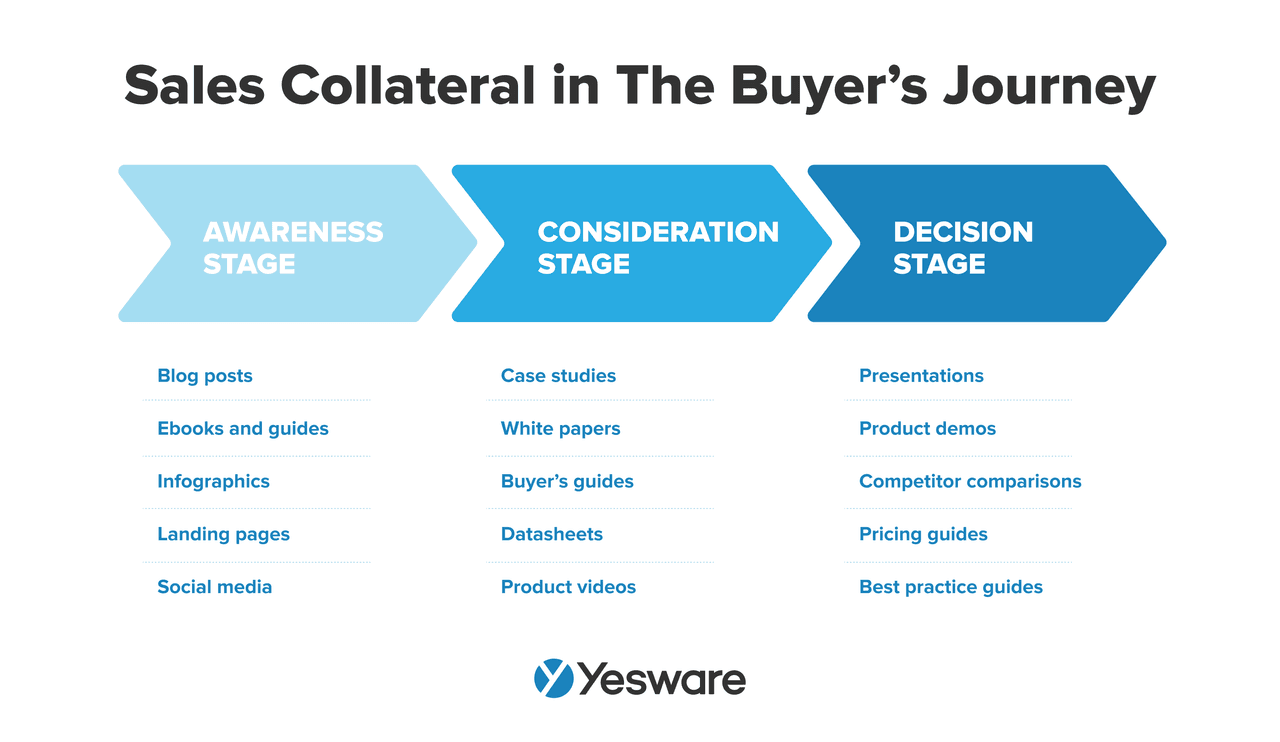
Sales AI can help sales reps write winning outreach messages, analyze them for effectiveness, and then optimize them based on the results.
It can also help users tweak their existing messages and content to better suit different buyer segments, making it easy to deliver personalized content without reinventing the wheel each time.
Many AI tools can also analyze your sales messages and collateral and share data-driven insights about tone, language choice, and other nuanced factors that will help them reach buyers with as much personalization (and impact) as possible.
With all of these benefits, using AI for sales prospecting helps teams build a better sales pipeline—period. Sales reps waste less time, sales cycles get shorter, and teams close more deals.
AI Tools and Technologies for Sales Teams
Picking the right AI tool can be overwhelming. There are tools for just about every part of the sales process, and there is a real risk of overbuying when it comes to AI.
Keep an eye out for the following important features when you’re searching for the right tool(s) to meet your team’s needs.
Predictive Analytics
Predictive analytics in sales isn’t new.
Many sales teams have used predictive analytics for years, with many tangible benefits. Here’s how it works:
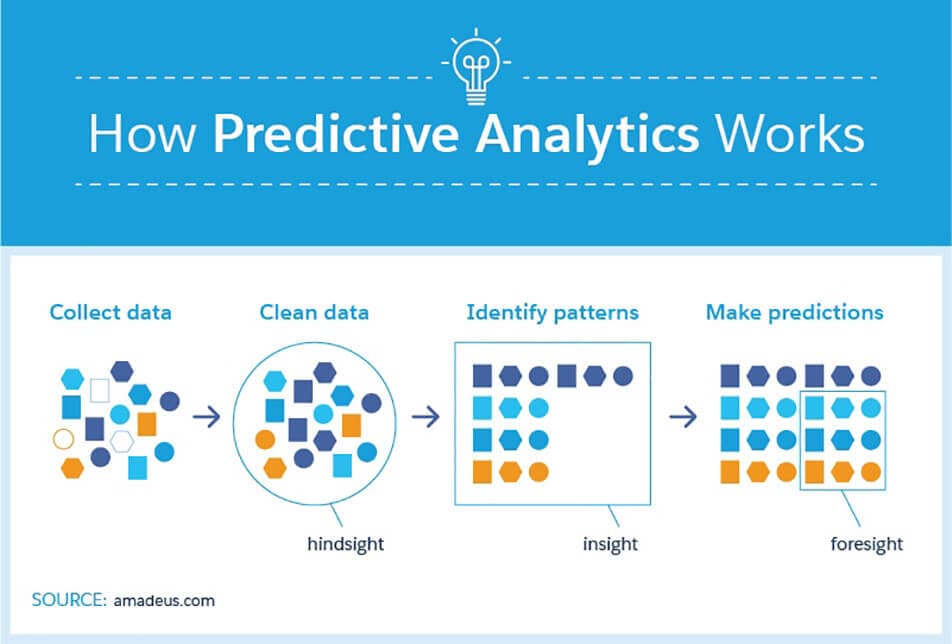
But sales AI takes predictive analytics up a notch (or ten).
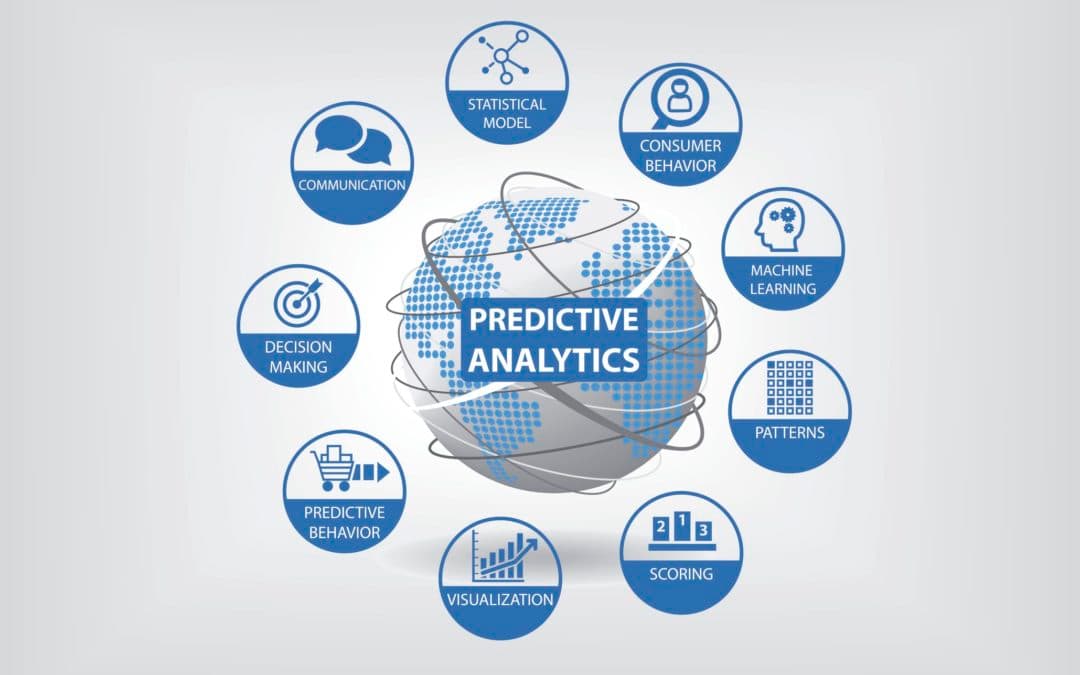
Predictive web and data analytics vector icons
More and more data becomes available for salespeople every day. AI for sales prospecting is built to stay one step ahead of that rapid growth and can actually harness that data for strategic predictions.
Machine Learning
Machine learning is one of the things that makes AI different from other kinds of technology.
Simply put, machine learning is a technology’s ability to learn and improve its capabilities on its own, without explicit human guidance or intervention.
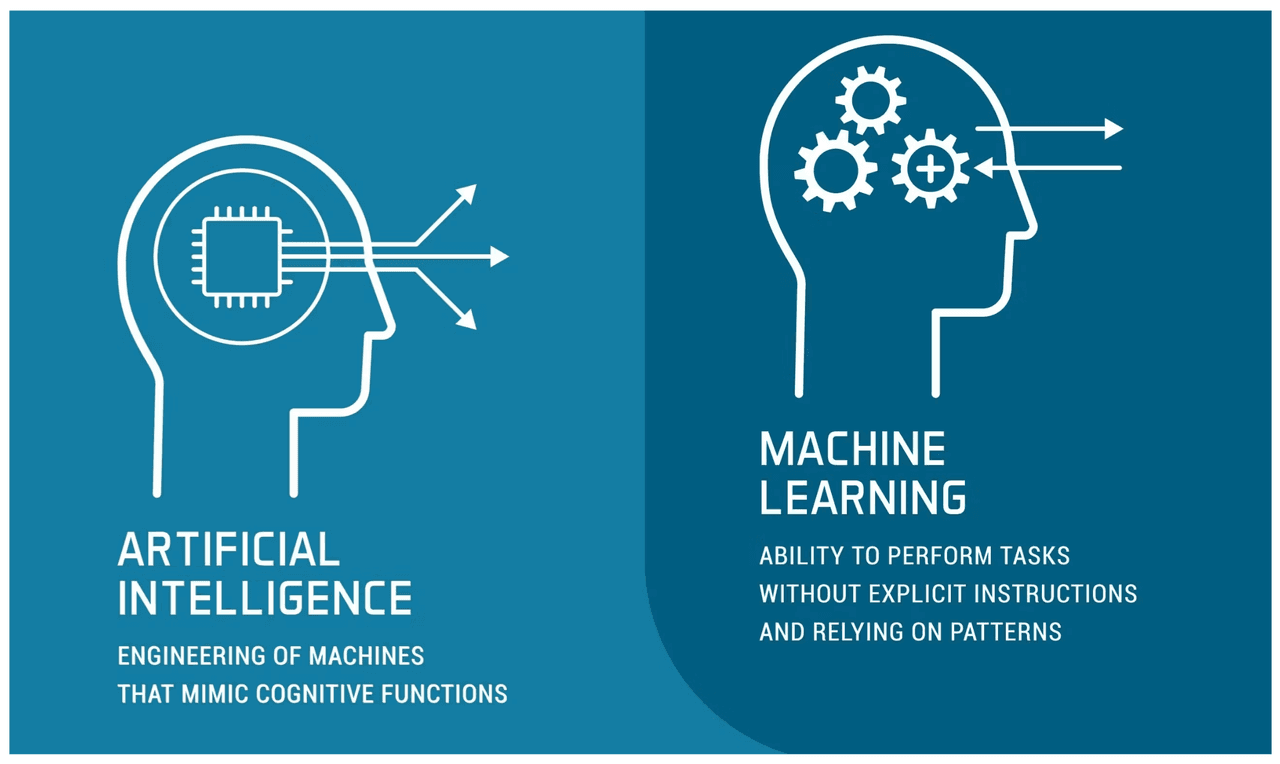
In other words, machine learning gives AI technology the ability to improve its abilities based on its own experience.
This is a tremendous asset for data-driven sales teams that could potentially transform the goal-setting process. With AI constantly optimizing strategy and messaging in the background, many sales teams can build a well-oiled prospecting machine that funnels a steady lead of highly qualified prospects into the pipeline.
Natural Language Processing
Natural language processing (NLP) is the aspect of AI that makes it so beneficial, specifically for sales messaging and content.
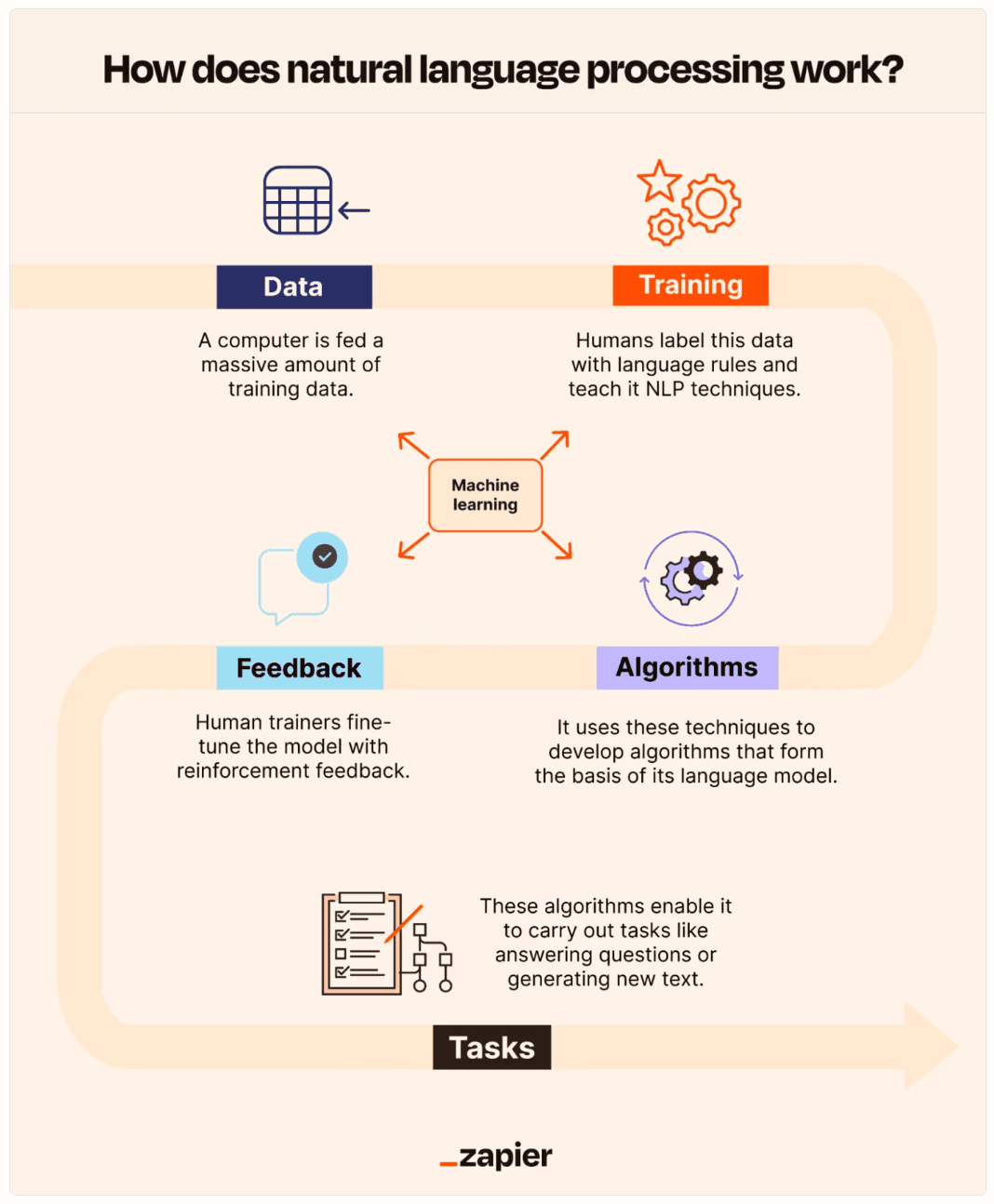
This technology helps sales reps gain a deeper understanding of what kind of messaging is most likely to resonate with individual prospects. It can help users optimize their verbiage, their tone, their email subject lines, and more.
NLP helps sales teams ensure that their messaging is on point, all the time, for each and every unique prospect.
AI-Powered Sales Prospecting Tools
Yesware
Yesware was built to help sales teams perform personalized, meaningful outreach at scale—without the complexity and complications of an enterprise-level system.
With our multi-channel campaigns, it’s easy for sales reps to manage the prospecting process with multiple leads at once.

And with Yeware, none of your messages (including follow-ups) will sacrifice timeliness or personalization. Your follow-ups are automatically sent after a set amount of time if the recipient doesn’t respond or book a meeting.
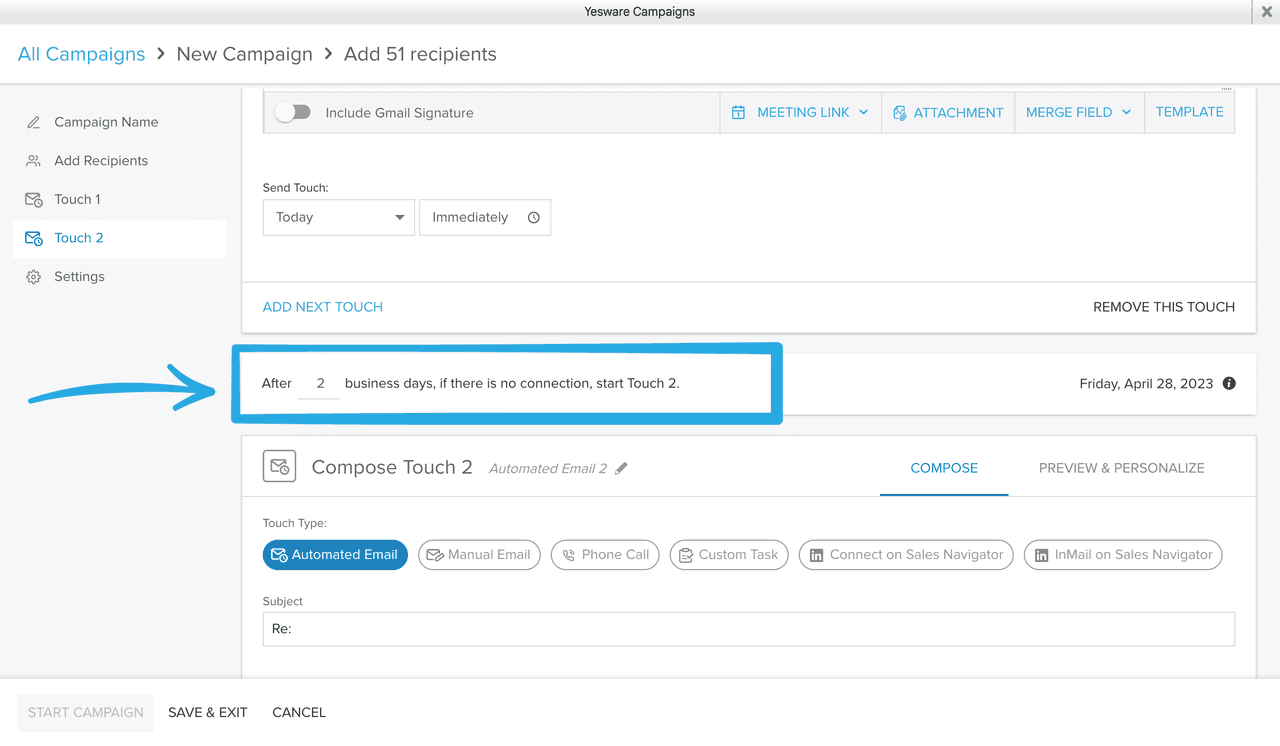
Our email template feature allows you to save and store your highest-performing emails.

And, of course, the feature designed specifically for prospecting: our Prospector tool was built to make this part of the sales process easier, more powerful, and more data-driven, with access to 100+ million enriched business profiles.

Users can bulk-add contacts from the Prospector, making it easy to start filling your pipeline and reaching out in as little time as it takes to download Yesware (less than 2 minutes).
Then, our easy-to-read analytics and reports give sales reps both real-time and big-picture insights about how their outreach is performing with their target market.

And with native integrations with Salesforce, Gmail, Outlook, LinkedIn, and more, syncing Yesware with your existing prospecting tools is fast and easy.
Vendasta
Vendasta‘s platform is designed to harness the power of AI, making sales prospecting more efficient, targeted, and data-driven.
Their powerful tool, Snapshot Report, provides marketing agencies with a detailed analysis of a prospect’s online presence.
By generating a customized report highlighting areas where a prospect’s digital marketing, reputation, and online listings could be improved, sales teams can use this data to tailor their pitch and demonstrate value upfront.
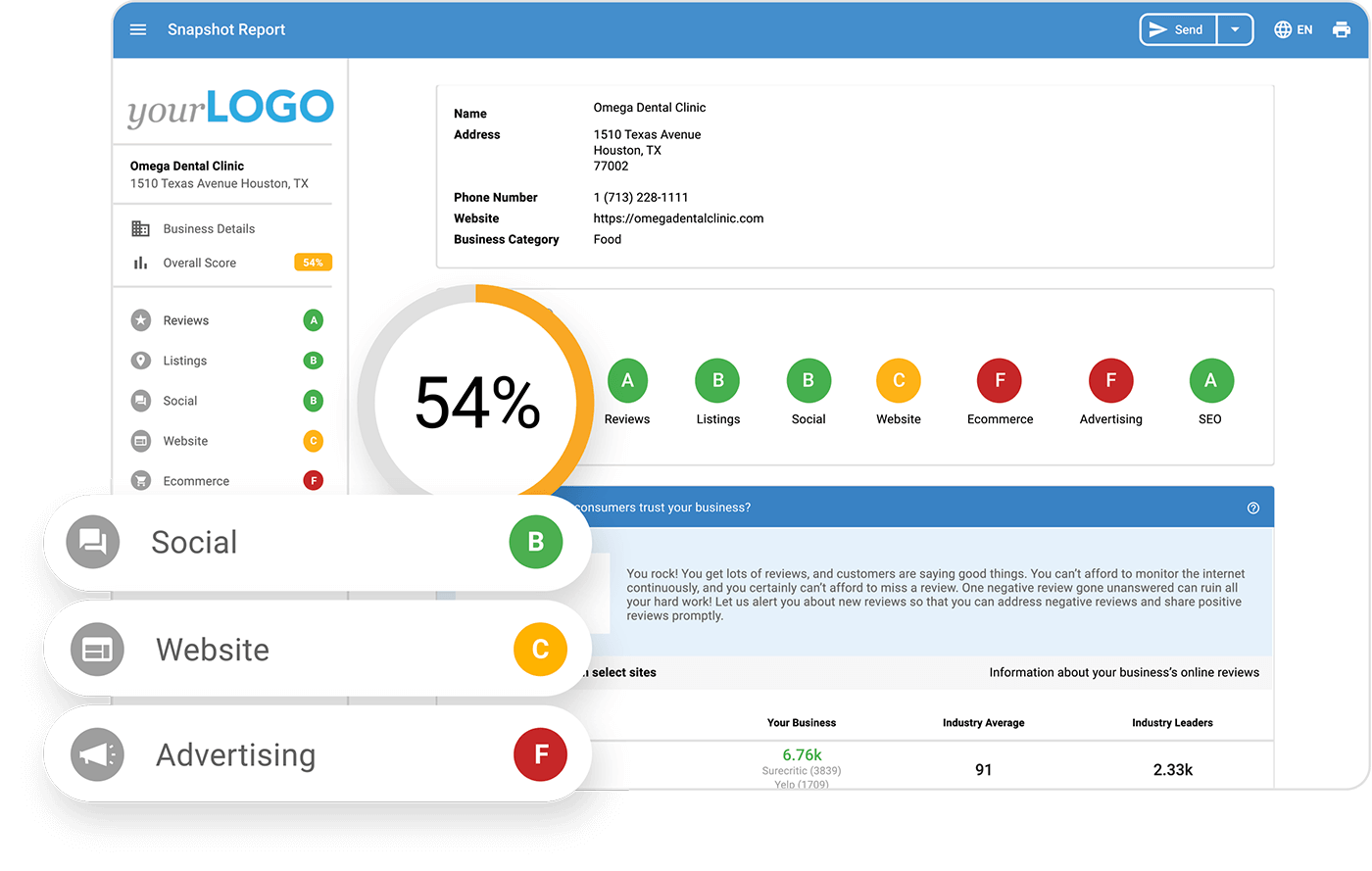
Vendasta also helps sales teams rank prospects based on their likelihood of converting. This allows teams to prioritize their outreach efforts and spend more time nurturing high-value leads, increasing the chances of successful conversions.
This sort of tool does a great job of leveraging AI for sales prospecting, making sales teams’ prospecting process smarter, faster, and more effective.
ChatGPT
ChatGPT offers several advantages that can enhance the prospecting process for sales professionals.
One of the most notable advantages of using this tool is email outreach creation. ChatGPT can help you with crafting fresh, compelling outreach messages to your prospects.
How? Explain what you’re looking for and a bit about the prospect’s needs and pain points to ChatGPT, and it will generate a polished message for you. Looking to add something new and fresh to your cold emails? Ask ChatGPT to send you informative articles or industry insights to help you build trust and credibility. Looking to enhance your sales pitch? Send ChatGPT your pitch and ask for a more engaging version based on specific criteria.

ChatGPT can automate various other repetitive tasks for you, such as lead research, data entry, and data analysis—with its help, you can remove the repetitive tasks from your sales prospecting process.
Other AI sales tools include:
- Zoho CRM
- Salesforce Einstein
- InsightSquared
- Clari
- Gong.io
- Drift
- Loom AI
- Hubspot
Practical Tips for Implementing AI in Your Sales Processes
Keep in mind the following tips and best practices for implementing AI for sales prospecting and other parts of the sales process.
Learn the Lingo
While most sales AI platforms are relatively user-friendly, there are some basic AI-specific things that users need to know in order to get the most out of the technology.
For example, sales reps who want to rely on AI should practice writing prompts.
A “prompt,” in AI terms, is essentially the directions you give to the system regarding what you’d like it to generate.
Sales reps who use AI will learn quickly that the better—read: more specific—your prompts, the more effectively your AI will work for you (and your buyer).

Writing effective AI prompts is a skill that comes with experience and (sometimes amusing) trial and error.
Keep in mind the following tips for writing sales AI prompts.

There are other AI-specific “hacks” that teams will hone over time to improve the effectiveness of their tools.
Invest in Training
With the first tip in mind, it’s a good idea to invest in training for your team to help them learn all of the ins and outs of the AI lingo, features, and tools available to them.
Again, many platforms are relatively user-friendly, but training will help your teams maximize the tools’ potential and help ensure you’re using them to their fullest extent.
Be Selective
When it comes to your tech stack—and especially AI tools—more does not always equal better.
Take the time to choose the right AI prospecting tools for your team. Not only do the platforms you choose need to integrate with whatever’s already in your tech stack, but they also need to be adopted and implemented faithfully by everyone on the team.
Finding the right combination of a tool that’s easy to use but powerful, impressive but affordable, and meets the needs of the sellers on your team and the buyers in your market can take quite a bit of time. Don’t rush into a buying decision.
Keep a Human Element
As capable as AI can be—and as uncannily human as it may seem—it’s important to keep real human sales reps involved in the prospecting process and beyond.
AI tools for sales prospecting should be used to support and enhance a sales team’s overall process, not replace their involvement.
Challenges and Considerations
As AI becomes more widely adopted in sales, some teams have encountered a few challenges along the way.
Keep the following considerations in mind as you navigate this new technology in your prospecting process.
Lack of Data
Some SMBs may not have wide and/or varied enough data sets to “train” their AI platform when they first start implementing it.
The more your team uses the AI platform, the more the technology will continue to learn and improve from the new data you add as time goes on.
The more you use AI, the “smarter” it gets.
Tip: Looking to get started? We used AI to analyze our own data to find a bunch of actionable sales tips for you. Check them out below.
 Sales Engagement Data Trends from 3+ Million Sales ActivitiesLooking at millions of tracked email activity over the past few years, this ebook is filled with our top studies and findings to help sales teams accelerate results.
Sales Engagement Data Trends from 3+ Million Sales ActivitiesLooking at millions of tracked email activity over the past few years, this ebook is filled with our top studies and findings to help sales teams accelerate results.Over-Reliance on the Tools
The flip side of that coin is that AI can sometimes be too amazing, and there’s often a temptation to use it for any and every part of the sales process.
While it’s true that AI software probably could handle most aspects of closing a deal from start to finish, remember that the sales rep should still be in the driver’s seat every step of the way.
Not only is that important from an ethical standpoint (buyers believe they’re working with a rep, not a robot), but it’s also the best way to make both the reps on your team and the tool itself as powerful as possible.
Trustworthiness of Tools
Given how quickly AI in sales is growing, some of the privacy and data concerns have yet to be fully set in stone; AI governance principles and regulations are still being introduced and updated on a regular basis.
Nothing is more important than protecting buyer data. It’s crucial that whatever tools your team invests in are dedicated to maintaining strict privacy practices. Your team should also do your own due diligence to maintain compliance, as well.
Conclusion
AI in sales has already made an incredible impact on the capabilities of sales reps. If reps can leverage the power of AI for sales prospecting, they can fill their pipeline with more promising leads and close more deals.
The challenge can be finding the right tool—one that maximizes your team’s outreach strategies without overwhelming the rest of your process.
Sign up for Yesware for free today to learn how Yesware can enhance your sales efforts with AI.
Get sales tips and strategies delivered straight to your inbox.
Yesware will help you generate more sales right from your inbox. Try our Outlook add-on or Gmail Chrome extension for free, forever!
Related Articles
Casey O'Connor
Casey O'Connor
Melissa Williams
Sales, deal management, and communication tips for your inbox

